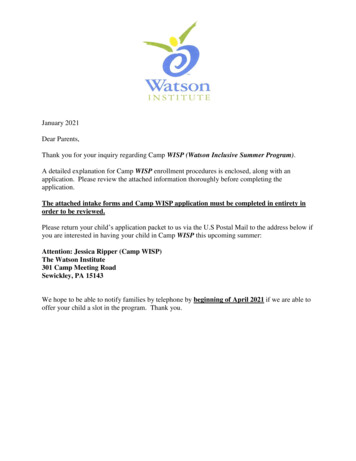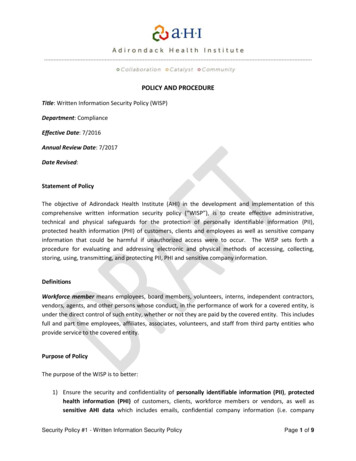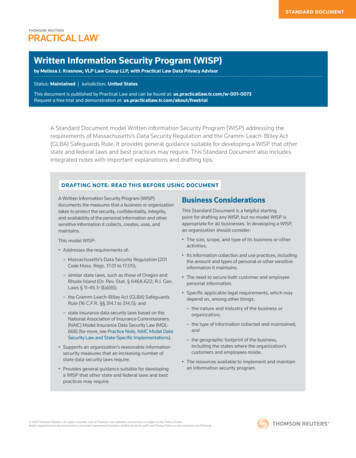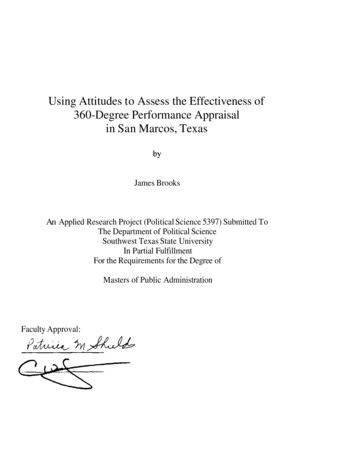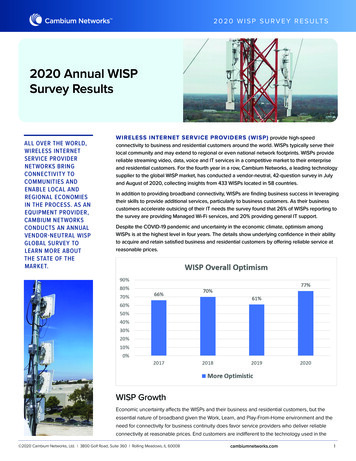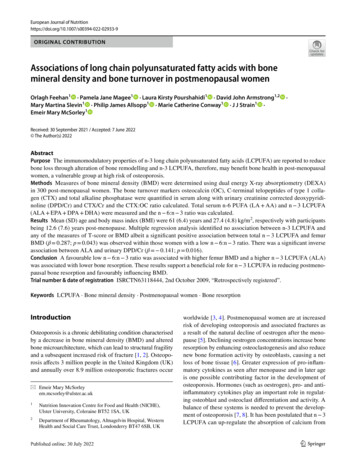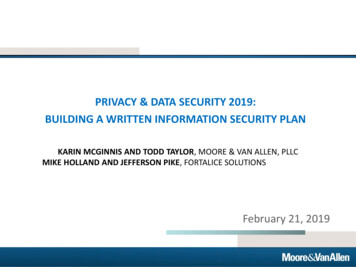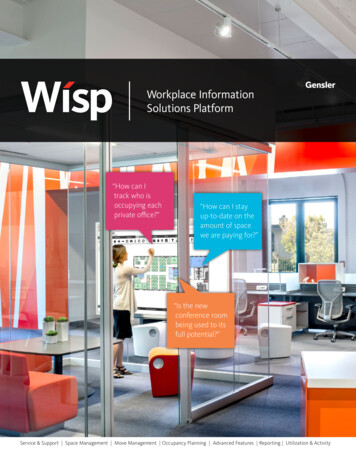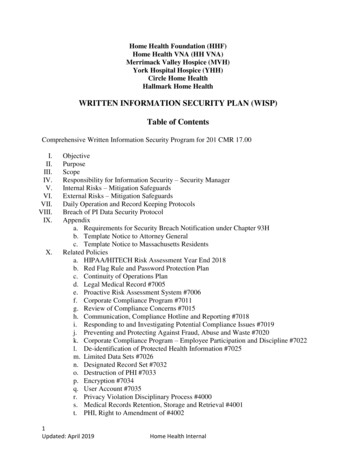
Transcription
Home Health Foundation (HHF)Home Health VNA (HH VNA)Merrimack Valley Hospice (MVH)York Hospital Hospice (YHH)Circle Home HealthHallmark Home HealthWRITTEN INFORMATION SECURITY PLAN (WISP)Table of ContentsComprehensive Written Information Security Program for 201 CMR seScopeResponsibility for Information Security – Security ManagerInternal Risks – Mitigation SafeguardsExternal Risks – Mitigation SafeguardsDaily Operation and Record Keeping ProtocolsBreach of PI Data Security ProtocolAppendixa. Requirements for Security Breach Notification under Chapter 93Hb. Template Notice to Attorney Generalc. Template Notice to Massachusetts ResidentsRelated Policiesa. HIPAA/HITECH Risk Assessment Year End 2018b. Red Flag Rule and Password Protection Planc. Continuity of Operations Pland. Legal Medical Record #7005e. Proactive Risk Assessment System #7006f. Corporate Compliance Program #7011g. Review of Compliance Concerns #7015h. Communication, Compliance Hotline and Reporting #7018i. Responding to and Investigating Potential Compliance Issues #7019j. Preventing and Protecting Against Fraud, Abuse and Waste #7020k. Corporate Compliance Program – Employee Participation and Discipline #7022l. De-identification of Protected Health Information #7025m. Limited Data Sets #7026n. Designated Record Set #7032o. Destruction of PHI #7033p. Encryption #7034q. User Account #7035r. Privacy Violation Disciplinary Process #4000s. Medical Records Retention, Storage and Retrieval #4001t. PHI, Right to Amendment of #40021Updated: April 2019Home Health Internal
u. PHI, Accounting for Disclosures of #4003v. Faxing PHI #4004w. Medical Record – Scanning of Documentation #4006x. PHI, Authorization for use or Disclosure of #4007y. PHI, Client’s Right of Access to/Release of M/R Information #4008z. PHI, Minimum Necessary Use and Disclosure of #4009aa. PHI, Notice of Privacy Practices #4010bb. Use of Electronic Main (E-mail) in Communication of Restricted Information#4013cc. Alternative Communication of PHI #4013dd. Security, Safeguarding and Staff Access to M/R Information #4014ee. Access to PHI in an Emergency Event #4015ff. Confidential Paper Disposal #4016gg. Destruction of Patient Records #4017hh. Electronic Signature, Attestation and Authorship in Electronic Medical Record(EMR) #1009ii. Vendor Confidentiality #1011jj. Passwords for Information Systems #1034kk. Information Security, Responsibility for #1052ll. HHF Portal Policy/Procedure #1056mm.HIPAA Privacy – Reporting of Data Breaches #1064nn. Virtual Private Network (VPN) Remote Access #1065oo. HHF Breach ToolComprehensive Written Information Security Program for 201 CMR 17.00201 CMR 17.00: Standards for the Protection of Personal Information of Residents of theCommonwealth is the regulation that implements the provisions of M.G.L. c. 93H relative to thestandards to be met by persons who own or license personal information (PI) about a resident ofthe Commonwealth of Massachusetts. As a part of the requirements of this regulation, HomeHealth Foundation and its subsidies is creating, implementing and training employees on thiswritten information security program (WISP).The information contained herein is a part of the Corporate Compliance Program at Home HealthFoundation.I. OBJECTIVEHHF has developed this to create effective administrative, technical and physical safeguards forthe protection of personal information for the residents of the Commonwealth of Massachusetts,as well as our employees, and to comply with our obligations under 201 CMR 17.00.The WISP sets forth our procedure for evaluating and addressing our electronic and physicalmethods of accessing, collecting, storing, using, transmitting, and protecting personalinformation of residents of the Commonwealth of Massachusetts.2Updated: April 2019Home Health Internal
For purposes of this WISP, “personal information” is as defined in the regulations: aMassachusetts resident's first name and last name or first initial and last name in combinationwith any one or more of the following data elements that relate to such resident:a. Social Security number;b. Driver's license number or state-issued identification card number; orc. Financial account number, or credit or debit card number, with or without any requiredsecurity code, access code, personal identification number or password, that would permitaccess to a resident’s financial account; provided, however, that “personal information”shall not include information that is lawfully obtained from publicly availableinformation, or from federal, state or local government records lawfully made available tothe general public.II. PURPOSEThe purpose of the WISP is to promote achievement of the following:1. Ensure the security and confidentiality of personal information;2. Protect against any reasonably anticipated threats or hazards to the security or integrity ofsuch information; and3. Protect against unauthorized access to or use of such information in a manner that createsa substantial risk of identity theft or fraud.III. SCOPEIn formulating and implementing the WISP, HHF has addressed and incorporated the followingprotocols:1. Identified reasonably foreseeable internal and external risks to the security,confidentiality, and/or integrity of any electronic, paper or other records containingpersonal information;2. Assessed the likelihood and potential damage of these threats, taking into considerationthe sensitivity of the personal information;3. Evaluated the sufficiency of existing policies, procedures, customer information systems,and other safeguards in place to control risks;4. Designed and implemented a WISP that puts safeguards in place to minimize those risks,consistent with the requirements of 201 CMR 17.00; and5. Implemented regular monitoring of the effectiveness of those safeguards.IV. RESPONSIBILITY FOR INFORMATION SECURITY – Security ManagerHHF has designated the V.P. of Quality, Compliance and Risk to implement, supervise, delegateauthority and maintain the WISP. The V.P. of Quality, Compliance and Risk has delegatedinformation security responsibility to the Director of Information Technology (Security) and tothe Health Information and Compliance Coordinator (Health Information Privacy). Thesedesignated employees (the “Data Security Coordinators”) will be responsible for the following:3Updated: April 2019Home Health Internal
1.2.3.4.5.Implementation of the WISP including all provisions outlined in Section VI;Daily operation protocols;Training of all employees;Regular testing of the WISP’s safeguards;Evaluating the ability of any of our third-party service providers to implement andmaintain appropriate security measures for the personal information to which we havepermitted them access, and requiring such third-party service providers by contract toimplement and maintain appropriate security measures;6. Reviewing the scope of the security measures in the WISP at least annually, or wheneverthere is a material change in our business practices that may implicate the security orintegrity of records containing personal information;7. Reviewing and revising any and all sections of this WISP as appropriate, as a result of aninvestigation of a data breach of personal information; and8. Conducting training sessions for all managers, employees and independent contractors,including temporary and contract employees who have access to personal information onthe elements of the WISP.V. INTERNAL RISKS – MITIGATION/SAFEGUARDSThe following areas have been identified as reasonably foreseeable internal and external risksand have been assessed, considering the safeguards which are implemented as part of this WISPas noted:a. Personal information is used during the quoting of prospective accounts and theservicing and remarketing of existing clients’ accounts.--Some of this PI is found on paper records and files that are maintained at employees’ desksfor the period of time that the corresponding accounts are being worked.Upon completion of the tasks and work corresponding to the paper records and files forthese documents are then placed in a shred bin on the Agency floor until a third-partyservice provider, a shredding company, is called to come and dispose of these papers viashredding. A receipt and certificate of destruction is provided once the papers have beenshredded.PI is also found in an electronic format in the agency management system and in a separatedocument management system (that contains both client and employee information). AllAgency employees have a unique used id and password for both systems that contain PI,and security permissions are set to restrict access to employee data to management only.b. All Agency employees have physical access to the few filing cabinets that aremaintained at the Agency that contain PI. All Agency employees are deemed to have atrue, business-related need, to have access to said information.c. PI is also transmitted via email during the course of normal Agency operations. Mostoften this information is regarding start of care and is via (documents) attached to theemails. Internal email within our systems is encrypted.4Updated: April 2019Home Health Internal
To guard against internal risks to the security, confidentiality, and/or integrity of any electronic,paper or other records containing personal information, and evaluating and improving, wherenecessary, the effectiveness of the current safeguards for limiting such risks, the followingmeasures are employed:1. We will only collect personal information of patients, customers or employees that isnecessary to accomplish our legitimate business transactions or to comply with any andall federal, state or local regulations.2. Access to records containing personal information shall be limited to those employeeswhose duties, relevant to their job description, have a legitimate need to access saidrecords, and only for this legitimate job-related purpose.3. Written and electronic records containing personal information shall be securelydestroyed or deleted at the earliest opportunity consistent with business needs or legalretention requirements.4. Our frequent business records associated retention and secure destruction periods areincluded in Destruction of PHI #7033.5. A copy of the WISP/PHI Considerations is to be distributed to employees at newemployee orientation. It shall be the employee’s responsibility for acknowledging inwriting, by signing the acknowledgement sheet, that he/she has received a copy of theWISP and will abide by its provisions. Employees are encouraged and invited to advisethe WISP Data Security Coordinators of any activities or operations which appear to poserisks to the security of personal information. If the Data Security Coordinators is him orherself involved with these risks, employees are encouraged and invited to advise anyother manager or supervisor or business owner.6. All employment contracts, where applicable, will be amended to require all employees tocomply with the provisions of the WISP and to prohibit any nonconforming use ofpersonal data as defined by the WISP.7. Terminated employees must return all records containing personal data, in any form, intheir possession at the time of termination. This includes all data stored on any portabledevice and any device owned directly by the terminated employee8. A terminated employee’s physical and electronic access to records containing personalinformation shall be restricted at the time of termination. This shall include remoteelectronic access to personal records, voicemail, internet, and email access. All keys,keycards, access devices, badges, company IDs, business cards, and the like shall besurrendered at the time of termination.9. Disciplinary action will be applicable to violations of the WISP, irrespective of whetherpersonal data was actually accessed or used without authorization. All security measuresincluding the WISP shall be reviewed at least annually to ensure that the policiescontained in the WISP are adequate meet all applicable federal and state regulations.10. Should operation practices change in a way that impacts the collection, storage, and/ortransportation of records containing personal information the WISP will be reviewed toensure that the policies contained in the WISP are adequate meet all applicable federaland state regulations.11. The Data Security Coordinator(s) or designee shall be responsible for all review andmodifications of the WISP and shall fully consult and apprise V.P. of Quality,5Updated: April 2019Home Health Internal
Compliance and Risk of all reviews including any recommendations for improvessecurity arising from the review.12. The Executive Administrative Assistant to the CEO, or designee shall maintain a securedand confidential master list of all lock combinations, passwords, and keys. The list willidentify which employees possess keys, keycards, or other access devices and that onlyapproved employees have been provided access credentials.13. The Data Security Coordinators or his/her designee shall ensure that access to personalinformation in restricted to approved and active user accounts.14. Current employees’ user ID’s and passwords shall conform to accepted securitystandards. All passwords shall be changed at least every 90 days, more often as needed.15. Employees are required to report suspicious or unauthorized use of personal informationto a supervisor, Data Security Coordinators or V.P. Of Quality, Compliance and Risk.16. Whenever there is an incident that requires notification pursuant to the Security BreachNotifications of Massachusetts General Law Chapter 93H: “Security Breaches”, the V.P.of Quality, Compliance and Risk or designee shall conduct root cause and post-incidentreview of events and actions taken, if any, in order to determine how to alter securitypractices to better safeguard personal information.VI. EXTERNAL RISKS – MITIGATION/SAFEGUARDSTo guard against external risks to the security, confidentiality, and/or integrity of any electronic,paper or other records containing personal information, and evaluating and improving, wherenecessary, the effectiveness of the current safeguards for limiting such risks, the followingmeasures are mandatory and are employed:1. Firewall protection, operating system security patches, and all software products shall bereasonably up-to-date and installed on any computer that stores or processes personalinformation.2. Personal information shall not be removed from the business premises in electronic orwritten form absent legitimate business need and use of reasonable security measures, asdescribed in this policy.3. All system security software including, anti-virus, anti-malware, and internet securityshall be reasonably up-to-date and installed on any computer that stores or processespersonal information.4. There shall be secure user authentication protocols in place that:a. Control user ID and other identifiers;b. Assigns passwords in a manner that conforms to accepted security standards, orapplies use of unique identifier technologies;c. Control passwords to ensure that password information is secure.VII. DAILY OPERATION and RECORD KEEPING PROTOCOLSThis section of our WISP outlines our daily efforts to minimize security risks to any computersystem that processes or stores personal information, ensures that physical files containingpersonal information are reasonable secured and develops daily employee practices designed to6Updated: April 2019Home Health Internal
minimize access and security risks to personal information of our clients and/or customers andemployees.Daily Operation Protocols shall be reviewed and modified as deemed necessary. Anymodifications to the Daily Operation Protocols shall be published in an updated version of theWISP.Recordkeeping Protocols: We will only collect personal information of clients and customersand employees that is necessary to accomplish our legitimate business transactions or to complywith any and all federal and state and local laws.The Daily Operation Protocols and the Recordkeeping Protocols are made up of thefollowing features:1. Any personal information stored shall be disposed of when no longer needed for businesspurposes or required by law for storage. Disposal methods must be consistent with thoseprescribed by the WISP.2. Any paper files containing personal information of patients or employees shall be storedin a locked filing cabinet. The V.P. of each company will determine a limited list ofemployees who will maintain the keys to the secured data location and the Data SecurityCoordinators will be assigned keys to filing cabinets to only those individuals are allowedaccess to the paper files.3. Individual files may be assigned to employees on an as-needed basis by the departmentsupervisor.4. All employees are prohibited from keeping unsecured paper files containing personalinformation in their work area when they are not present (e.g. lunch breaks).5. At the end of the day, all files containing personal information are to be returned to thelocked filing cabinet by all employees. Department heads, managers or coordinators areresponsible for assuring adherence.6. The Compliance Department or IT Department will conduct periodic, unannounced workspace audits to assess for the existence of unsecured personal information.7. Paper or electronically stored records containing personal information shall be disposedof in a manner that complies with M.G.L. c. 93I sec. 2 (See Attachment D: Standards fordisposal of records containing personal information; disposal by third party; enforcement)and as follows:a. Paper documents containing personal information shall be either redacted, burned,pulverized or shredded so that personal data cannot practicably be read orreconstructed;b. Electronic media and other non-paper media containing personal informationshall be destroyed or erased so that personal information cannot practicably beread or reconstructed.c. Electronic records containing personal information shall not be stored ortransported on any portable electronic device, sent or transmitted electronically toany portable device, or sent or transported electronically to any computer,portable or not, without being encrypted. The only exception shall be where there7Updated: April 2019Home Health Internal
is no reasonable risk of unauthorized access to the personal information or it istechnologically not feasible to encrypt the data as and where transmitted.d. If necessary for the functioning of individual departments, the department head, inconsultation with the Data Security Coordinators or V.P. of Quality, Complianceand Risk, may develop departmental rules that ensure reasonable restrictions uponaccess and handling of files containing personal information and must complywith all WISP standards. Departmental rules are to be published as an addendumto the WISP and be added to the Information Security Plan.Access Control ProtocolsHHF shall control access to personal information based upon employee role. We shall alsoapply the standard of minimum necessary and limit data sets to those required to successfullycomplete required job tasks. We shall employ the following:1. All our computers shall restrict user access to those employees having an authorized andunique log-in ID assigned by the Information Technology Department.2. All computers that have been inactive for 5 or more minutes shall require relog- in.3. After 5 unsuccessful log-in attempts by any user ID, that user ID will be blocked fromaccessing any computer or file stored on any computer until access privileges arereestablished by the Data Security Coordinators or his/her designee.4. Access to electronically stored records containing personal information shall beelectronically limited to those employees having an authorized and unique login IDassigned by the Data Security Coordinators.5. Where practical, all visitors who are expected to access areas other than the lobby spaceat all work locations or are granted access to office space containing personal informationshould be required to sign-in with a Photo ID at a designated reception area where theywill be assigned a visitor’s ID or guest badge. Visitors are required to wear said visitor IDin a plainly visible location on their body, unless escorted at all times.6. Where practical, all visitors are restricted from areas where files containing personalinformation are stored. Alternatively, visitors must be escorted or accompanied by anapproved employee in any area where files containing personal information are stored.7. Cleaning personnel (or others on site after normal business hours and not also authorizedto have access to personal information) are not to have access to areas where filescontaining personal information are stored.8. All computers with an internet connection or any computer that stores or processespersonal information must have a reasonably up-to-date version of software providingvirus, anti-spyware and anti-malware protection installed and active at all times.9. An inventory of all company computers and handhelds authorized for personalinformation storage is contained in HIPAA/HITECH Risk Assessment Year End 2018,which shall be made known only to the Data Security Coordinators and other managerson a “need to know” basis.Third Party Service Provider ProtocolsAny service provider or individual that receives, stores, maintains, processes, or otherwise ispermitted access to any file containing personal information (“Third Party Service Provider”)8Updated: April 2019Home Health Internal
shall be required to meet the following standards as well as any and all standards of 201 CMR17.00. (Examples include third parties who provide off-site backup storage copies of all ourelectronic data; paper record copying or storage service providers; contractors or vendorsworking with our customers and having authorized access to our records):1. Any contract with a Third-Party Service Provider signed on or after March 1, 2010 shallrequire the Service Provider to implement security standards consistent with 201 CMR17.00.2. It shall be the responsibility of the V.P. of Quality, Compliance and Risk or designee toobtain reasonable confirmation that any Third-Party Service Provider is capable ofmeeting security standards consistent with 201 CMR 17.00.3. Any existing contracts with Third Party Service shall be reviewed by the V.P. of Quality,Compliance and Risk or designee. These Service Providers shall meet the securitystandards consistent with 201 CMR 17.00 by March 1, 2012 or other Service Providerswill be selected, when feasible to do so.4. A list of currently known third party service providers is contained in Attachment B:Third Party Service ProvidersVIII. Breach of PI Data Security ProtocolShould any employee know of a security breach at any of our facilities, or that any unencryptedpersonal information has been lost or stolen or accessed without authorization, or that encryptedpersonal information along with the access code or security key has been acquired by anunauthorized person or for an unauthorized purpose, the following protocol is to be followed:1. Employees are to notify the V.P. of Quality, Compliance and Risk and/or Data SecurityCoordinators in the event of a known or suspected security breach or unauthorized use ofpersonal information.2. The V.P. of Quality, Compliance and Risk shall be responsible for drafting a securitybreach notification to be provided to the Massachusetts Office of Consumer Affairs andBusiness Regulation and the Massachusetts Attorney General’s office. The securitybreach notification shall include the following (also see Appendix).:a. A detailed description of the nature and circumstances of the security breach orunauthorized acquisition or use of personal information;b. The number of Massachusetts residents affected at the time the notification issubmitted;c. The steps already taken relative to the incident;d. Any steps intended to be taken relative to the incident subsequent to the filing ofthe notification; ande. Information regarding whether law enforcement officials are engaged in investingthe incident3. The notice to the Attorney General and the Director of Consumer Affairs and BusinessRegulation will also require to certify that credit monitoring services comply with Section3A.4. HHF shall provide notice as soon as practicable and without unreasonable delay (a) whenit knows or has reason to know of a PI security breach, or (b) knows or has reason toknow that PI was acquired or used by an unauthorized person or used for an unauthorizedpurpose (see Appendix).9Updated: April 2019Home Health Internal
5. The V.P. of Quality, Compliance and Risk shall be responsible for drafting a securitybreach notification to be provided to the Massachusetts Residents impacted. The securitybreach notification shall include the following (also see Appendix):a. the consumer’s right to obtain a police report;b. how a consumer requests a security freeze;c. the necessary information to be provided when requesting the security freeze; andd. that there shall be no charge for a security freeze; provided however, that thenotification shall not include:e. the nature of the breach or unauthorized acquisition or use; orf. the number of Massachusetts residents affected by the security breach or theunauthorized access or use.6. Per April 2019 Amendment, “A notice [to the Massachusetts Residents impacted]provided pursuant to this section shall not be delayed on grounds that the total number ofresidents affected is not yet ascertained. In such case, and where otherwise necessary toupdate or correct the information required, a person or agency shall provide additionalnotice as soon as practicable and without unreasonable delay upon learning suchadditional information.”7. Whenever there is a PI security breach or unauthorized use of PI, there shall be animmediate mandatory post-incident review of events and actions taken, if any, todetermine whether any changes to HHF’s security practices and the WISP are required toimprove the security of PI for which HHF is responsible.10Updated: April 2019Home Health Internal
AppendixRequirements for Security Breach Notifications under Chapter 93HPursuant to M.G.L. c. 93H, s. 3(b), if you own or license data that includes personal informationof a Massachusetts resident, you are required to provide written notice as soon as practicableand without unreasonable delay to:1. The Attorney General (AGO);2. The Director of the Office of Consumer Affairs and Business Regulation (OCABR); and3. The affected Massachusetts residentWhen you know or have reason to know (a) of a breach of security; or (b) that personalinformation of a Massachusetts resident was acquired by or used by an unauthorized person orused for an unauthorized purpose.Credit Monitoring ChangesEighteen (18) months of credit monitoring services are now required per April 2019Amendment.Notice to the AGO and OCABRThe notice to the Attorney General and the Director of Consumer Affairs and BusinessRegulation shall include, but not be limited to:1. the nature of the breach of security or the unauthorized acquisition or use;2. the number of Massachusetts residents affected by such incident at the time ofnotification; the name and address of the person or agency that experienced the breach ofsecurity;3. the name and title of the person or agency reporting the breach of security, and theirrelationship to the person or agency that experienced the breach of security;4. the type of person or agency reporting the breach of security;5. the person responsible for the breach of security, if known;6. the type of personal information compromised, including but not limited to, socialsecurity number, driver’s license number, financial account number, credit or debit cardnumber or other data;7. whether the person or agency maintains a written information security program; and8. any steps the person or agency has taken or plans to take relating to the incident,including updating the WISP.The notice to the Attorney General and the Director of Consumer Affairs and BusinessRegulation will also require that they certify that credit monitoring services comply with Section3A.See Attorney General Template below.11Updated: April 2019Home Health Internal
Notice to Affected Massachusetts ResidentsA person or agency that has experienced a breach of security or the unauthorized acquisition oruse of personal information of Massachusetts residents must also provide notice to those affectedMassachusetts residents. This notice shall include, but not be limited to:1) the consumer’s right to obtain a police report;2) how a consumer requests a security freeze;3) the necessary information to be provided when requesting the security freeze; and4) that there shall be no charge for a security freeze; provided however, that the notification shallnot include:a) the nature of the breach or unauthorized acquisition or use; orb) the number of Massachusetts residents affected by the security breach or the unauthorizedaccess or use.Per April 2019 Amendment, “A notice provided pursuant to this section shall not be delayed ongrounds that the total number of residents affected is not yet ascertained. In such case, and whereotherwise necessary to update or correct the information required, a person or agency shallprovide additional notice as soon as practicable and without unreasonable delay upon learningsuch additional information.”12Updated: April 2019Home Health Internal
ATTORNEY GENERAL NOTIFICATION TEMPLATE LETTERAttorney General Maura HealeyOffice of the Attorney GeneralOne Ashburton Place, 20th FloorBoston, MA 02108Dear Attorney General Healey:Pursuant to M.G.L., c. 93H, we are writing to notify you of a (a breach of security/anunauthorized access to use of personal
Red Flag Rule and Password Protection Plan c. Continuity of Operations Plan d. Legal Medical Record #7005 e. Proactive Risk Assessment System #7006 f. Corporate Compliance Program #7011 . Comprehensive Written Information Security Program for 201 CMR 17.00 201 CMR 17.00: Standards for the Protection of Personal Information of Residents of the .

